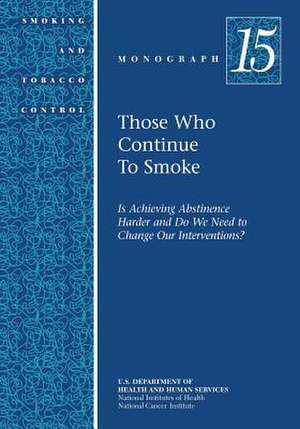Those Who Continue to Smoke
Autor U. S. Department of Heal Human Services, National Institutes of Health, National Cancer Instituteen Limba Engleză Paperback
Preț: 136.38 lei
Preț vechi: 143.57 lei
-5% Nou
Puncte Express: 205
Preț estimativ în valută:
26.10€ • 28.34$ • 21.92£
26.10€ • 28.34$ • 21.92£
Carte tipărită la comandă
Livrare economică 22 aprilie-06 mai
Preluare comenzi: 021 569.72.76
Specificații
ISBN-13: 9781499653120
ISBN-10: 1499653123
Pagini: 160
Dimensiuni: 178 x 254 x 9 mm
Greutate: 0.29 kg
Editura: CREATESPACE
ISBN-10: 1499653123
Pagini: 160
Dimensiuni: 178 x 254 x 9 mm
Greutate: 0.29 kg
Editura: CREATESPACE
